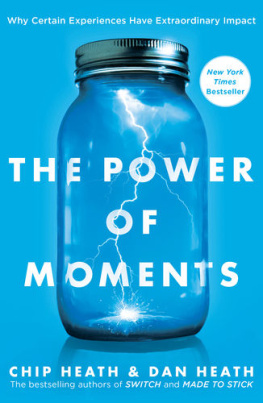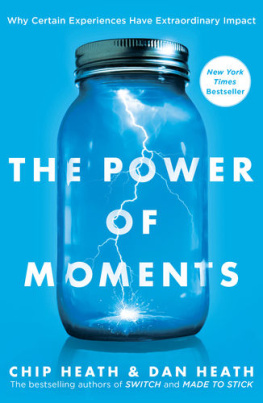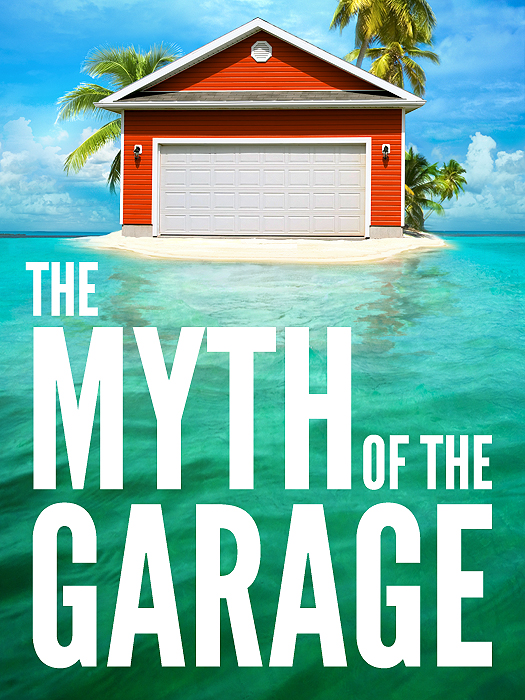Also by Dan Heath and Chip Heath
Made to Stick: Why Some Ideas Survive and Others Die
Switch: How to Change Things When Change Is Hard
Copyright 2011 by Dan Heath and Chip Heath
All rights reserved.
Published in the United States by Crown Business, an imprint of the Crown Publishing Group, a division of Random House, Inc., New York.
www.crownpublishing.com
CROWN BUSINESS is a trademark and CROWN and the Rising Sun colophon are registered trademarks of Random House, Inc.
Portions of this work have been previously published in Fast Company magazine from 20072011.
eISBN: 978-0-307-95359-9
Cover design by Justin Gammon
v3.1
Note to Readers
It has become a Christmas tradition in the Heath household to order the Surprise Bag from Archie McPhee, a quirky toy store based in Seattle. One of the kids in the family does the honors of opening the bag, which arrives as a brown grocery sack stapled at the top. You dont know what will be inside; you have to take your chances. The goodies range from the practical (Corn Dog Lip Balm) to the entertaining (Emergency Yodel Button) to the thought-provoking (Sigmund Freud Action Figure).
This collection is, roughly speaking, our surprise bag. We wrote a column for Fast Company for four years, from 2007 to 2011, and weve selected our favorites for The Myth of the Garage. Some are extremely opinionated: Well insist that you never buy another mutual fund (The Horror of Mutual Funds), and well call out some of the sleaziest marketers of modern times by name (Stigma Abusers). In other pieces, well try to shed some light on certain mysteries in the business world: For instance, why did Second Life fail to take over the world, as seemed inevitable five years ago (The Future Fails Again)? Or, why will customers often pay to have some of their choices revoked (On Handcuffs)?
If youre familiar with our past work, youll know that it has a pragmatic bentMade to Stick explained how to communicate with impact, and Switch discussed some principles for making change easier. (Some brothers fix up cars; we write how-to books.) Youll find practical pieces here as well: Some thoughts on sparking creativity (Get Back in the Box) and some advice on explaining innovations (Anchor & Twist).
We hope you enjoy the collectionand also the price point, which is a minor milestone. (This is the first free eBook published by Crown Publishers.) The first surprise in the collection is the title piece, The Myth of the Garage, in which well argue that Apple did not, in fact, start in a garage. Read on!
Dan and Chip Heath
Contents
THE MYTH OF THE GARAGE
First published December 19, 2007
Tales of groundbreaking innovation sound a lot alike. Like action-adventure movies, they have a predictable structure. You know how Die Hard 4 is going to end and you know how YouTube began: Some ordinary guys, without money or power, triumphed via a brilliant insight and scrappy groundwork, just like Hewlett and Packard, who started in a garage. Or Jobs and Woz, who founded Apple in a (different) garage. Or Michael Dell, who lived the same tale but upgraded to a dorm room. Rebels, all of them, who triumphed over Big Business.
But what if those stories mislead us about what it takes to generate great ideas? Two researchers from the Haas School of Business at UC Berkeley, Pino Audia and Chris Rider, have debunked the Myth of the Garage in a recent paper. The garage, they say, evokes the image of the lone individual who relies primarily on his or her extraordinary efforts and talent to triumph. The reality is that successful founders are usually organizational products. A separate study of VC-backed companies found that 91% were related to the founders prior job experience. Audia and Rider say entrepreneurial triumphs arent due to lonely, iconoclastic worktheyre eminently social. Wait a minute: Entrepreneurs arent rebels, then, so much as recently departed organization men and women.
Consider two of the founders of YouTube, Steve Chen and Chad Hurley. Both cut their teeth at PayPal; in fact, Hurley was one of PayPals first employees and even designed its logo. (He is also the son-in-law of James Clark, who founded Netscape and Silicon Graphics.) Top-tier venture-capital firms were calling them, offering money, counsel, and connections, within months of launch. You have to admit, this tale isnt quite as uplifting as the more familiar YouTube origin story, in which twentysomething buddies create a cool site to swap videos with friends and then it goes gangbusters.
As for Jobs and Wozniak, yes, there was a garage, but less discussed is Jobss background at Atari (he was employee number 40) and HP (What I learned there was the blueprint we used for Apple, he told a journalist in 2003). Meanwhile, Wozniak was an engineer at HP, and he gave it the first shot at his microcomputer idea. (Bad call, HP.)
In other words, companies arent born in garages. Companies are born in companies.
This reality shouldnt diminish these monumental achievements. Yet it feels like it does, because we crave the excitement of these creation myths. Your startup emerged from a systematic discussion of market opportunities, conducted at a networking function at the Marriott? Yawn. Give us the garage. In fact, the Apple story would be even more satisfying if Jobs and Wozniak had actually built the garage first, by hand, out of toothpicks scavenged from local restaurants.
Because we eat these stories up, ideas tend to evolve to suit our fancies. Christopher Columbus, we all know, wanted to prove he could reach India by sailing west. But no one believed his absurd theory that the earth was round; his own sailors were terrified their ships would fall off the edge. His crew almost mutinied!
But that version of Columbus is a myth, according to historical sociologist James Loewen. In Columbuss day, most people knew that the world was round. The evidence was there for them to see: People noticed that, when another ship receded into the horizon, its hull disappeared first, and then the mast later, which suggested that there was some kind of curvature in play. Furthermore, Columbuss three ships enjoyed lovely sailing, with no record of mutinous talk. And he actually set sail to find gold, not to strike a blow for geography.
Columbus arguably discovered the New World. Kind of a big deal. But as with garage entrepreneurs, we want more. We like Columbuss story even more when, en route, he has to fight off a feisty crew.
As stories are told and retold, they evolve. They come to emphasize individuals, not organizations; to celebrate a flash of insight over stepwise improvements; and to exaggerate obstacles while downplaying institutional support. In years to come, expect YouTubes triumphant story to grow even grander than it is today. But if youre starting a company or launching a product, dont get lured into scouting out a garage. Learn from your predecessors: First, get a job.
THE BIRTH OF A STICKY IDEA
First published April 1, 2010
If you were on a New York subway last fall, you might have noticed a provocative ad that showed soda being poured from a plastic bottle into a glass tumbler. By the time the soda hit the tumbler, it had transformed into fatglobby, disgusting, yellow-orange human fat, which pooled in the bottom of the glass and burped over the brim. The headline: ARE YOU POURING ON THE POUNDS?












